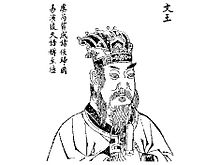Wen (Zhou King)
Wen , King of Zhou ( Chinese : 周文王; Pinyin : Zhōu Wén Wáng ) was a man from around the 12th to the 11th century BC. Living leader of the Zhou tribe and the father of King Wu , the founder of the Chinese Zhou dynasty . He allegedly ruled the Zhou from 1099 BC. BC to 1050 BC BC, probably as king from 1056 BC. BC to 1050 BC Chr.
Life
Originally, the Zhou settled on a small territory in the west of the realm of the Shang Dynasty , for example in today's Shaanxi Province . King Wen, whose personal name was Ji Chang (姬昌, Jī Chāng), had auspicious moles on his body when he was born. Zhou Tai Wang , the legendary ancestor of the Zhou dynasty, therefore wanted to make Ji Chang's father Ji Li his heir to the throne; his two older sons voluntarily let Ji Li go first. Ji Chang received the title of "Lord of the West" ( Xi Bo), was therefore subject to them as a vassal. He ruled wisely and sought to win over good people. Under his rule, the power of the Zhou grew to a level that threatened the Shang. Even under his predecessors, the Zhou had grown in power. Ji Chang's father was killed on one of his campaigns near the Shang capital.
According to the literary sources, the rift between the Zhou and the last Shang king Di Xin was triggered by slander directed against Wen, because of which Ji Chang was imprisoned by the Zhou in Youli (probably in today's Tangyin in Henan ). In addition, more and more dignitaries at the Shang court were disgruntled and in some cases went over to the side of the Zhou. Probably the deeper reason for the later revolt of the Zhou against their overlords was that they pushed out of their less fertile settlement area in Shaanxi into the more productive heartland of the Shang.
Ji Chang was probably born in 1059 BC. Ransomed after three or seven years by the Zhou with gifts such as women and horses. Shortly afterwards, Zhou received the right from Shang to conduct campaigns on behalf of the Shang. Around the same time, Ji Chang took the title of King Wen or Wen Wang (roughly: cultivated king ). In 1053, King Wen moved with a force to the south of what is now Shanxi Province to take control of the fertile valley of the Fen River . A state called Li or Qi (near today's Changzhi ) was destroyed. A short time later, Wen destroyed the state of Yu (near today's Qinyang ), which was located about 100 km west of the Shang capital. King Wen died after an attack on Chong (probably today's Luoyang , strategically located at a ford across the Yellow River ). He left eight sons; his eldest son succeeded him as King Wu . King Wu defeated in 1045 BC. The Shang army at the battle of Muye and established the Zhou dynasty.
According to the Confucian tradition , Wen, who allegedly lived to be 97 years old and ruled the Zhou for 50 years, was the ideal ruler. During the time of his imprisonment in Youli he is said to have created the sixty-four hexagrams of the oracle book I Ching ("Book of Changes") and provided them with instructions.
literature
- Wenwang , in: Helmut Freydank et al. (Ed.): Lexikon Alter Orient , VMA-Verlag, Wiesbaden 1997, ISBN 3-928127-40-3 , p. 467.
Web links
- Wenwang in the Encyclopædia Britannica online
Individual evidence
- ^ Edward L. Shaughnessy: Calendar and Chronology . In: Michael Loewe and Edward L. Shaughnessy (Eds.): The Cambridge History of Ancient China . Cambridge University Press, 1999, ISBN 978-0-521-47030-8 , pp. 25 .
- ^ Edward L. Shaughnessy: Western Zhou History . In: Michael Loewe and Edward L. Shaughnessy (Eds.): The Cambridge History of Ancient China . Cambridge University Press, 1999, ISBN 978-0-521-47030-8 , pp. 301 .
- ^ Herbert Franke and Rolf wedding slip : Fischer Weltgeschichte , Vol. 19: The Chinese Empire , Fischer Bücherei GmbH, Frankfurt am Main 1968, ISBN 3-596-60019-7 , p. 38; Wenwang , in: Helmut Freydank et al. (Ed.): Lexikon Alter Orient , VMA-Verlag, Wiesbaden 1997, ISBN 3-928127-40-3 , p. 467.
- ^ A b Edward L. Shaughnessy: Western Zhou History . In: Michael Loewe and Edward L. Shaughnessy (Eds.): The Cambridge History of Ancient China . Cambridge University Press, 1999, ISBN 978-0-521-47030-8 , pp. 302 .
- ↑ Herbert Franke and Rolf wedding slip: The Chinese Empire , p. 38 f.
- ↑ a b Wenwang in the Encyclopædia Britannica online.
- ^ Edward L. Shaughnessy: Western Zhou History . In: Michael Loewe and Edward L. Shaughnessy (Eds.): The Cambridge History of Ancient China . Cambridge University Press, 1999, ISBN 978-0-521-47030-8 , pp. 307 ff .
- ^ Edward L. Shaughnessy: Western Zhou History . In: Michael Loewe and Edward L. Shaughnessy (Eds.): The Cambridge History of Ancient China . Cambridge University Press, 1999, ISBN 978-0-521-47030-8 , pp. 292 .
- ↑ Wen-Wang , in: Louis Gabriel Michaud (Ed.): Biographie universelle , 2nd edition, 1843 ff., Vol. 44, p. 472.
| personal data | |
|---|---|
| SURNAME | Whom |
| BRIEF DESCRIPTION | Leader of the Zhou tribe |
| DATE OF BIRTH | 12th century BC Chr. |
| DATE OF DEATH | 11th century BC Chr. |
